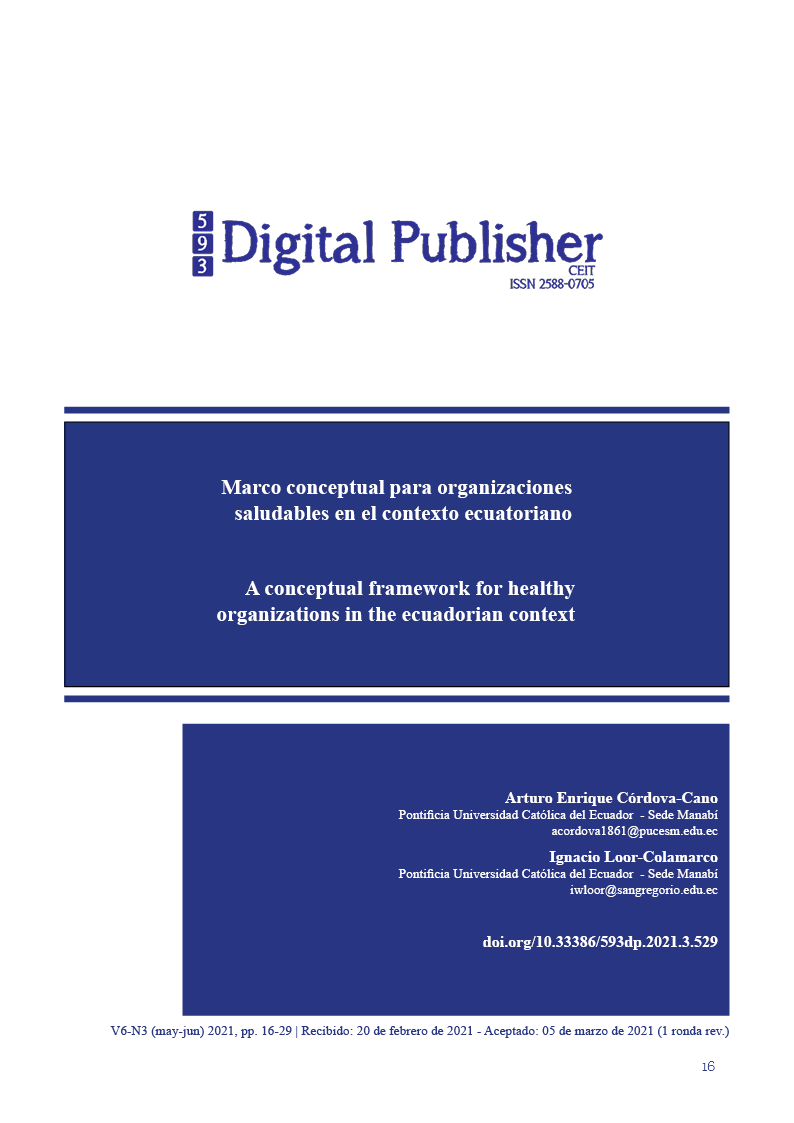A conceptual framework for healthy organizations in the ecuadorian context
Main Article Content
Abstract
Healthy organizations have the power to impact the individual performance of the employees, which has implications for the overall functioning and performance of the organization. However, the notion of healthy organization is not a one-size-fits-all proposition, but it varies from one context to another. This research develops the concept of healthy organization for the Ecuadorian corporate context. The study is exploratory and collects rich descriptions from executives and experts on the management of the human capital. The study also considers technical reports from organizations that have addressed the notion of healthy organization, such as the World Health Organization and the International Labor Organization. The arguments identified in these reports, along with data from the relevant literature, were contrasted with the primary data collected through in-depth interviews. The data analysis used grounded theory to identify the key issues and their interrelations. The output of this work was a conceptual framework for healthy organizations in Ecuador. The study examined the well-being of workers, the practices that promote well-being, the relationship between well-being and productivity, and the challenges of labor well-being in Ecuador. Finally, this work contributes to the scant literature on healthy organizations in Ecuador, which includes the concept of well-being, the relevant practices, and how these impact on the financial health or profitability of an organization. It is necessary to develop patterns or standards that can help managing healthy environments, considering the implementation of wellness planning, transparency, team management and the application of healthy practices.
Downloads
Article Details

This work is licensed under a Creative Commons Attribution-NonCommercial-ShareAlike 4.0 International License.
1. Derechos de autor
Las obras que se publican en 593 Digital Publisher CEIT están sujetas a los siguientes términos:
1.1. 593 Digital Publisher CEIT, conserva los derechos patrimoniales (copyright) de las obras publicadas, favorece y permite la reutilización de las mismas bajo la licencia Licencia Creative Commons 4.0 de Reconocimiento-NoComercial-CompartirIgual 4.0, por lo cual se pueden copiar, usar, difundir, transmitir y exponer públicamente, siempre que:
1.1.a. Se cite la autoría y fuente original de su publicación (revista, editorial, URL).
1.1.b. No se usen para fines comerciales u onerosos.
1.1.c. Se mencione la existencia y especificaciones de esta licencia de uso.
References
Achor, S. (2011). TED. (TEDxBloomington, Productor) Obtenido de https://www.ted.com/talks/shawn_achor_the_happy_secret_to_better_work?lan%20guage=es
Ben-Shahar, D. T. (2018). Entrevista a Dr. Tal Ben-Shahar Doctor en Psicología. 171. (A. Villajos, Entrevistador) Información Psicológica. Obtenido de https://dialnet.unirioja.es/descarga/articulo/6540548.pdf
Burke, R. J. (1980). Work Demands on Administrators and Spouse Well-Being. Human Relations, 33(4), 253-278. doi:https://doi.org/10.1177/001872678003300404
Chun Tie, Y., Birks, M., & Francis, K. (2019). Grounded theory research: A design framework for novice researchers. Sage Open Medicine, 7, 1-8. doi:https://doi.org/10.1177/2050312118822927
Cooper, C. L. (1994). Healthy Mind; Healthy Organization— A Proactive Approach to Occupational Stress. Human relations, 47(4), 455-471. doi:https://doi.org/10.1177/001872679404700405
Goertz, G. (2006). Social science concepts: A user’s guide. Princeton University Press.
Grawitch, M. J. (2019). Pseudoscience won’t create a psychologically healthy workplace. En M. J. Grawitch, Creating Psychologically Healthy Workplaces (págs. 42-64). Edward Elgar Publishing. doi:10.4337/9781788113427.00009
Group, T. A. (2018). VIII Encuesta Adecco La felicidad en el trabajo. Recuperado el 09 de 01 de 2020, de Group, T. A. (2018). VIII Encuesta Adecco La felicidad en el trabajo. The Adecco Group. Obtenido de https://www.adeccogroup.es/wp- content/uploads/2018/12/NdP-VIII-Encuesta-Adecco-La-felicidad-en-el- trabajo.pdf
Hernández, R., Fernández, C., & María, D. B. (2010). Metodología de la investigación (Quinta ed.). México: McGRAW-HILL / INTERAMERICANA EDITORES, S.A. DE C.V.
Hsieh, T. (2013). Delivering Happiness. A Path to Profits, Passion, and Purpose. New York: Profit.
Hwang, H., & Colyvas, J. A. (2020). Ontology, Levels of Society, and Degrees of Generality: Theorizing Actors as Abstractions in Institutional Theory. Academy of Management Review, 45(3), 570-595. doi:https://doi.org/10.5465/amr.2014.0266
Katić, I. K. (2019). The Impact of Stress on Life, Working, and Management Styles: How to Make an Organization Healthier? Sustainability, 11(15), 4026. doi:10.3390/su11154026
Salanova, M. M. (2005). Psicología Organizacional Positiva. En F. J. Palaci, Psicología Organizacional (págs. 349-376). Pearson Prentice Hall.
Seligman, M. E. (2011). Flourish: A visionary new understanding of happiness and well-being. New York: New York: Free Press.
Seligman, M., & Csikszentmihalyi, M. (2000). Positive Psychology: An Introduction. (C. G. University, Ed.) American Psychologist, 55, 5 y 14. doi:DOI: 10.1037/0003-066X.55.1.5
Siu, O. L. (2020). Occupational Stress and Its Economic Cost in Hong Kong: The Role of Positive Emotions. International Journal of Environmental Research and Public Health, 17(22), 8601. doi:https://doi.org/10.3390/ijerph17228601
Strauss, A., & Corbin, J. (1994). Grounded theory methodology: An overview. (N. K. (Eds.), Ed.) Handbook of qualitative research, 273-285. Obtenido de https://psycnet.apa.org/record/1994-98625-016
Wang, W. S. (2020). What Makes Employees’ Work So Stressful? Effects of Vertical Leadership and Horizontal Management on Employees’ Stress. Frontiers in psychology, 11, 340. doi:https://doi.org/10.3389/fpsyg.2020.00340



